Career: Standardbred Trainer
Hay Everyone!
It’s been a while since I’ve shared an idea for a career in the equine industry with you. This week we return to the series with a look into the life of a Standardbred racehorse trainer. Julie Miller, with Team Miller Stable, is a Standardbred trainer located right here in New Jersey. She’s a great friend of the Equine Science Center and even lets her horses participate in some of our research projects! I got to take a trip down to her stable for the interview. She had a new crop of young horses that had just arrived. Let me tell you, some of them looked cute! I know you’re not here for the cute horses though. You’re here to learn something, so keep reading to find out what life as a Standardbred trainer is like.
Lord Nelson (LN): What does a typical day of work look like for you?
Julie Miller (J.M.): On a typical day, I come in and I address all the horses. I walk my whole barn in the morning, anywhere from 5:00 to 6:30AM is when I start. I want to see if they’ve eaten and if they’re drinking their water. If it’s a horse that normally has his head out of the stall, I want to know why is his head back in the corner? I try to assess them all individually and see where I’m at for the day. If there is an issue, the groom might also tell me, “Hey, she didn’t eat or she tore up the stall today or doesn’t seem to be acting like herself”. If something is unusual, then that’s the first thing I worry about and maneuver through. If everything is good, I continue with my morning. If not, we take a temperature and assess that horse. So, that is the beginning of my day.
Then we start jogging the horses. This is their exercise. An average horse in my barn jogs four miles a day. If they’re racing, they train two trips a week. We modify and critique the training regimen based on the individual horse’s age, where it is racing, and how far it is in training.
I sometimes look at it like running a boutique. Each horse is an individual and must be trained and assessed as such. After jogging each horse, we reassess them. The caretakers or grooms bathe the horses and get them into their stall. We call it putting them away. They brush them, pick out their feet, check their legs, and generally make sure everything is okay. The grooms report back to me if there’s anything to note.
The veterinarian stops in at the end of the morning to check if I’ve pulled bloodwork or noticed any issues. We might spend some time addressing and evaluating an issue, if there is something I’ve noticed.
Then I head over to my office. I make schedules for the blacksmith and training. I figure out where horses are going for racing and what personnel are going with them. I also call, text, or email owners to give updates. This is also the time I use to pay bills and do invoices. Basically, I’m getting ready for the next day and the day after that.
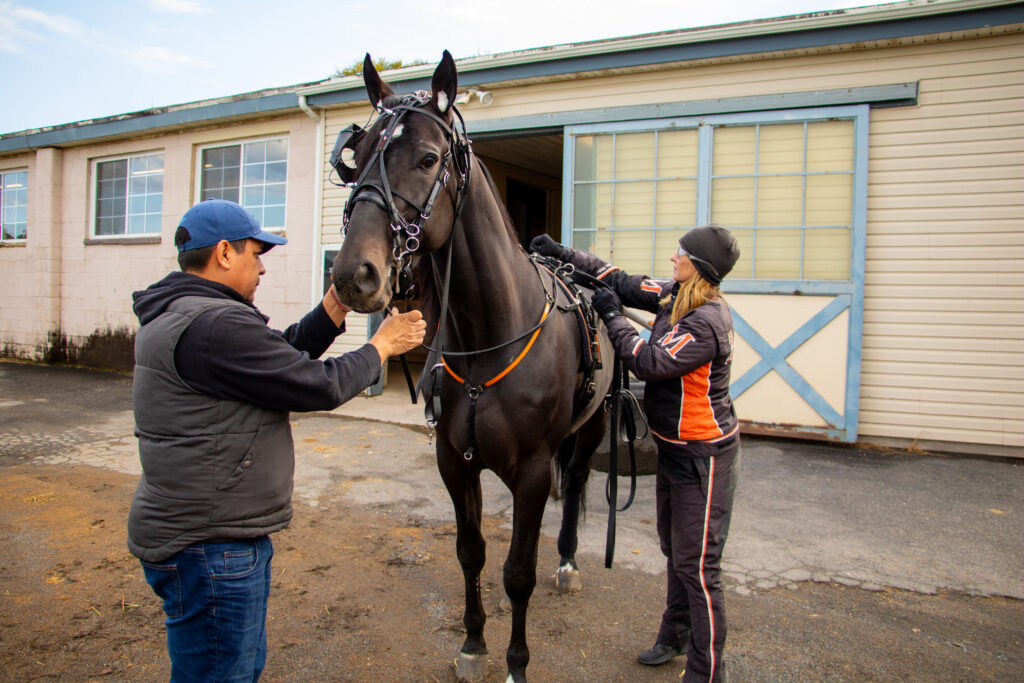
Julie getting ready to jog one of the horses on a chilly morning.
LN: What’s your favorite part about your job?
J.M.: Oh, man. Obviously, winning races is the big, big end game for us and generating purse money. I think, though, my favorite part is buying young horses somewhere like Lexington, KY and then getting them broken to the harness and training them for eight to nine months and then seeing them excel in races. That feels like my biggest accomplishment and makes me feel good. It’s why I love what I’m doing.
When you have 50 horses, not everything’s going right every day. You have to be strong for yourself, for your team, for your horses, and always put 110% in. If you do that, something good is going to happen for you
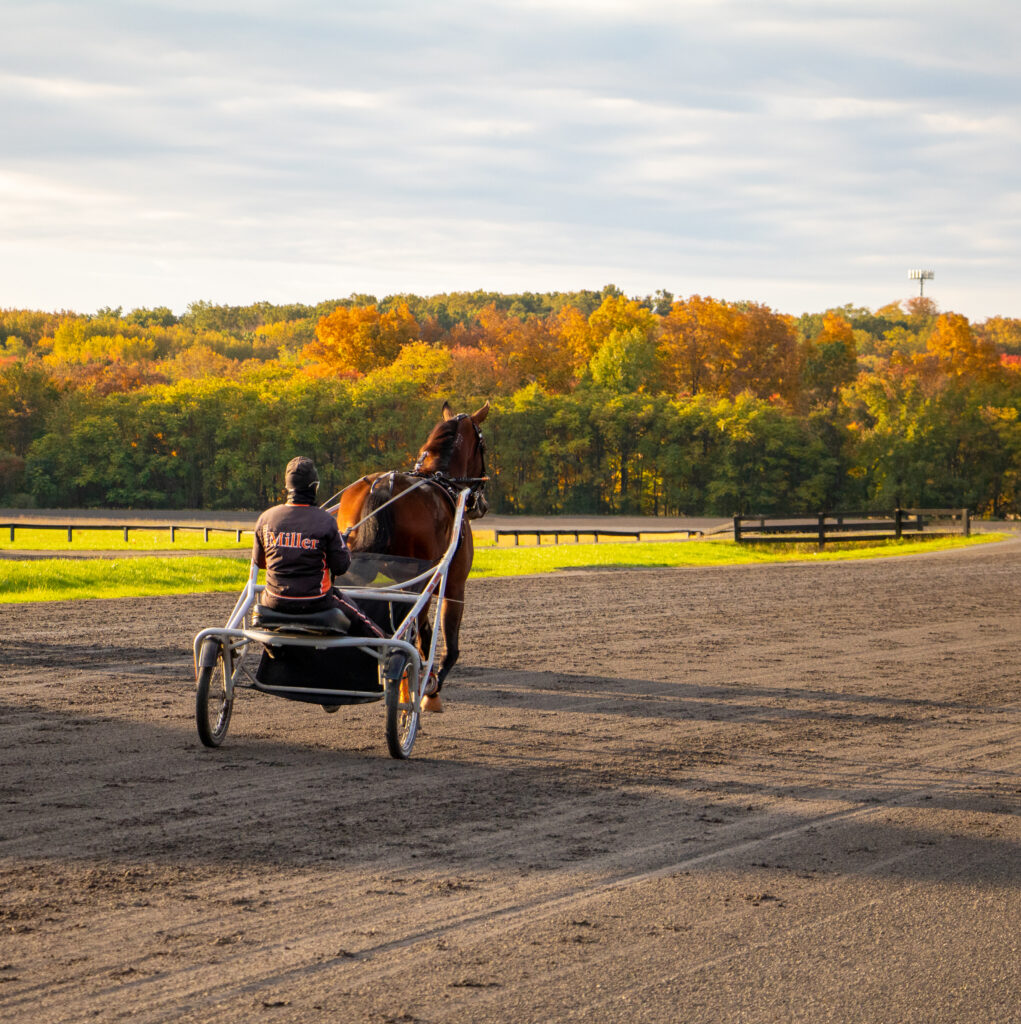
Julie on an early morning jog with one of the horses.
LN: What’s your least favorite part of the job?
J.M.: My least favorite part is when I have to deliver sad or bad news. People invest a lot of money in these horses. Everyone cares about them, from the owner who is spending the money to the caretaker who takes care for them every day. If something unfortunate happens and I have to report the horses is sick or not able to race anymore, that’s hard. If something happens, we provide aftercare and find him a home. It’s disappointing because you want everything to excel and make it in their career. In the real world, that’s not going to happen. I think that’s my saddest part. You work so hard and it doesn’t work out, but you just pull yourself up by your bootstraps and go back at it.
LN: Why did you choose to become a trainer and how did you go about establishing yourself in that role?
J.M.: I’m a third generation trainer. My grandpa and dad trained, but on a smaller scale. We just had races in the summers in Iowa, where I’m from. I grew up in it and fell in love with it. Fortunately, in Illinois we could go to Chicago and race horses at a higher level. I went to college and got my Bachelor’s of Science in nursing. I always tell people education is always valuable. In my nursing degree, I learned how to read blood work and care for people. Now, I apply these skills to horses. I’ve been really fortunate. I had a passion for horses and racing and got to follow it. I had an avenue in because of my family and then my husband is in the sport. We always said we would get married one day and go into the racing business.
I would tell anyone not to hesitate, just reach. You need to network with people. There are so many job opportunities in our sport from training to shipping to being a blacksmith to being a groom. If someone likes racehorses, they just need to contact someone in the industry. We have the SBOA (Standardbred Breeders and Owners Association) of New Jersey. That’s a great organization to reach out to, if you’re looking for job opportunities.
LN: Do you have any other advice you would offer to young people who might be interested in a similar career?
J.M.: The best advice I can give is learn all you can. Be a sponge and soak it all in. I still learn something new every day because I’m observing and I’m listening. As soon as you think you know everything, then you don’t know anything. Always be listening to your instructors and listening to the other students. If you can take a little piece of knowledge from everybody, then you can create your own way and accomplish what you want in life.
I think horses are a great career. It’s a rewarding career and it’s a lot of work. This job is 24/7 because we’re working with a living animal. You need to know what you’re getting yourself into. The rewards are exponential, though.
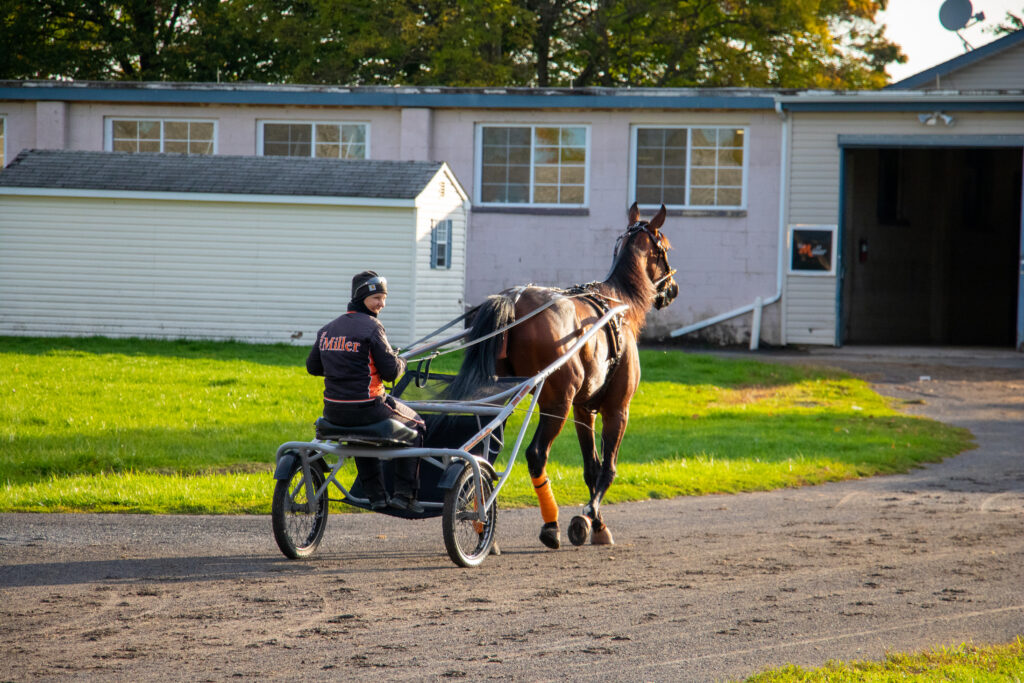
Julie returns to the barn after the horse’s morning workout for it to be taken care of and returned to its stall.
LN: Do you have a favorite memory from your career?
J.M.: Oh, there are so many. Pinpointing one is really hard, so I’m going to generalize it. I’m really fortunate that I can do this with my husband. It’s a family business. My son and daughter are also involved in this sport. They both went to college and are now back helping me. My son works here. It’s nice having it be a family business because you form good relationships with people. Winning the big races, like the big stakes races is fun. Getting to share it with my crew, though, is even more amazing. I have a great staff that’s been with me for a long time. That’s what really makes this great and gives me a sense of accomplishment.
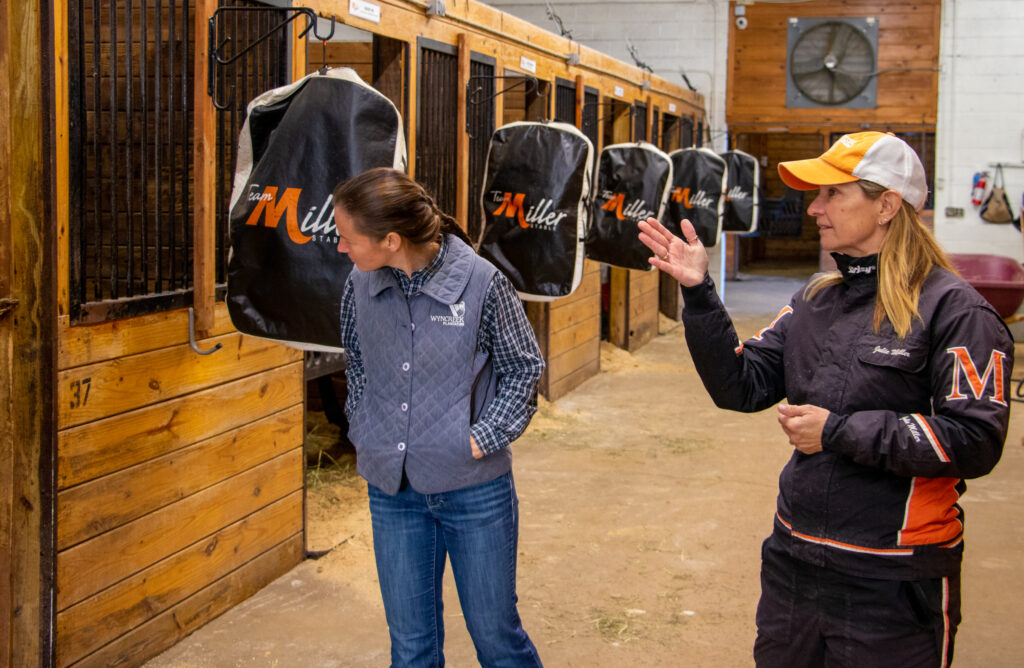
Julie shows Ellen the newest crop of young horses that will be entering training.
LN: Thanks for taking the time to share your thoughts and morning with me!
J.M.: It has been my pleasure, Lord Nelson. I would love to see more young people getting involved in this industry!
Whew, sounds like Julie stays busy. That’s a lot of horses and people to keep track of and manage! Do you think you have what it takes to be a Standardbred trainer? If so, you should start networking and making connections now! I hope you enjoyed this brief glimpse into life as a trainer.
Until Next Time.
Your Friend,
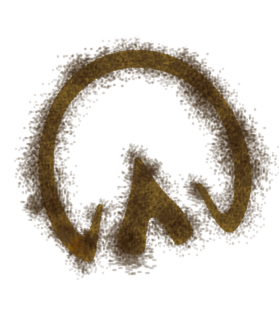
Lord Nelson
